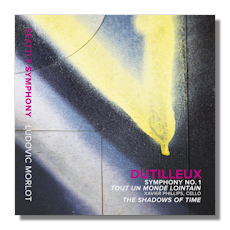
The Internet's Premier Classical Music Source
Related Links
- Latest Reviews
- More Reviews
-
By Composer
-
Collections
DVD & Blu-ray
Books
Concert Reviews
Articles/Interviews
Software
Audio
Search Amazon
Recommended Links
Site News
 CD Review
CD Review
Henri Dutilleux

- Symphony #1
- Tout un monde lointain *
- The Shadows of Time **
* Xavier Phillips, cello
** Benjamin Richardson, boy sopranos
** Kepler Swanson, boy soprano
** Andrew Torgelson, boy soprano
Seattle Symphony Orchestra/Ludovic Morlot
Seattle Symphony Media SSM1001
Having now heard all four releases on Seattle Symphony Media, as well as this orchestra's continued work on Naxos (which distributes these independent efforts), I can only praise the excellence on display. Ludovic Morlot has an obvious passion for French music; witness his Fauré disc, which easily sets a modern standard for that composer's orchestral works. The music of Dutilleux poses a greater challenge, and thankfully, the results remain first-class.
As Dutilleux's first work for orchestra, you might imagine the Symphony #1 (1951) to be fairly conventional. Not so. The first movement is a Passacaglia, the second a bracing Scherzo. The third movement is a disquieting Intermezzo, and finally the work concludes with an ingenious finale with variations. This last movement is a stunning orchestral rollercoaster ride, demanding virtuosity from each section of the orchestra. The composer doesn't sound quite like anyone else, but the Symphony is a highly individual statement that deserves wider exposure over 60 years on. The engineers faithfully capture the Seattle sound, but certain sections feel somewhat murky.
Tout un monde lointain was finished in 1970 for Mstislav Rostropovich, the greatest cellist of his age. Rostropovich would later record the work for EMI, and that reading would later appear as one of the "Great Recordings of the Century". This reading with Xavier Phillips proves an excellent modern alternative. Phillips' tone is huge, and he plays exceptionally. The Seattle Symphony accompanies with considerable skill, with Morlot on top form again as he tackles this difficult music. The sound here is clearer than in the Symphony, allowing for each section to be clearly heard. And that's a good thing; one senses the rapport than all these artists have with each other. The work is thrilling, and bristles with a sense of discovery and excitement.
I was unfamiliar with The Shadows of Time (1997), but it was written with at least a memory of WWII in mind. One movement is actually dedicated to Anne Frank. Unsurprisingly, this is not the happiest of music. It is deeply moving, though. The notes say it's not program music; and that is proven correct by the nature of the piece, which explores emotion and time more than it does any particular events. There is a tension here, a wariness and weariness throughout that puzzles and prods, but also satisfies. Dutilleux is content to simply ask questions as opposed to providing answers, so to speak. Percussive sounds and twisting winds, aided by shimmering strings, give an otherworldly impression. The clear tones of the three boy sopranos add to this mystique. Texts would have been useful, so naturally, they aren't here. No matter. The Seattle Symphony plays this – and indeed the entire program – with the confidence and familiarity of a Beethoven symphony, and Morlot is unquestionably devoted to showing this composer's music in the best possible way. The sound, especially in the lower ranges, is murky again, but the acoustics of Benaroya Hall are nearly always good overall. An ambitious project, very well done and representative of the evolution of a great career.
Copyright © 2014, Brian Wigman




















